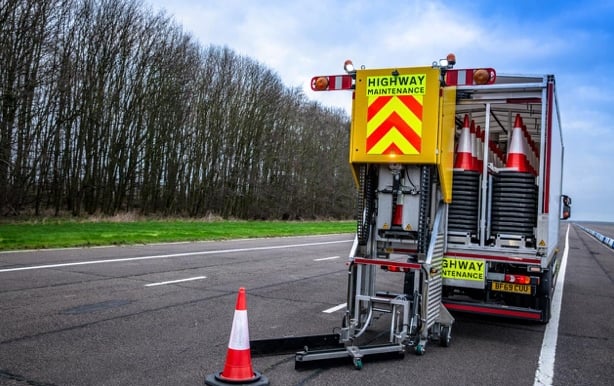Recently spotted in the Midlands was a pioneering cone laying vehicle – the machine is currently being trialled on the road network by the Highways Care. This smart invention will of course eliminate the need for road workers to do the job which will increase productivity. Further testing is set to take place on the M4 in Berkshire. The benefits of this for workplace safety is that it avoids the need for two people to manually lift and drop the cones in any weather!
The dangers imposed on people carrying out this job is that there is a rush of traffic going past on such busy roads and the bulk of this work is carried out at night time with workers having been reported as lifting 10 tonnes of equipment per shift. These automated cone lifting vehicles will place an ease on this labour and surely reduce hazards as well as freeing up workers to do other tasks.
Highways England Head of Lean and Continuous Improvement Martin Bolt, who oversees the project, said:
“The implications of these vehicles in protecting the safety of workers are immense and we are delighted that testing is progressing so well. By taking the human element out of laying cones we are eliminating one of the greatest risks for road workers. We have received a lot of support from the industry as a whole for the automated vehicle and we are now getting some very positive feedback from those workers who have been trialling the Highways Care prototype on the live roads network. If this testing proves as successful as we anticipate it will, motorists could be spotting more of these automated cone laying vehicles on the roads by the end of the year.”
Kier General Foreman Stuart Pegg, who used the vehicle to put out traffic management on the A5, said:
“It was great to be invited to participate in this ground-breaking advancement in traffic management. We have ironed out a few initial teething problems and I found the automated cone laying vehicle easy to use. It performed above my personal expectations.”
We at BIMsafe are excited to see how this progresses, we think this could definitely benefit the construction safety as well as productivity. We know that around 260-300 cones are required for a 2.5 mile road closure meaning that workers shift between five and six tonnes of cones, each weighing 10kg! With the weight of the objects the traffic exposure for these workers at present totals around two hours.
Highways England have set out a criteria for the machines – they must be safe for all road users and pose no risk to any traffic. The machines are also expected to lay or collect cones at a rate of one every 10 seconds. It certainly does look promising and we will be keeping an eye on the results to come.
Article reference from – https://www.gov.uk/government/news/automated-cone-laying-vehicle-spotted-on-roads-in-new-trial



Comments are closed